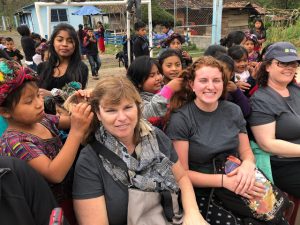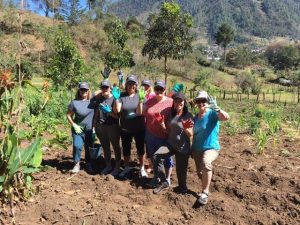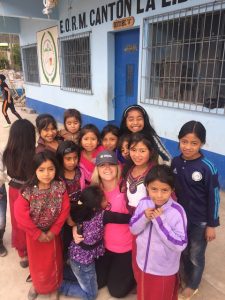Brewing a Generous Cup of Coffee
Others, Agriculture , BusinessContributed by: Food for the Hungry Canada
Written by Mike Janz
Take a Sunday morning sip of your complimentary cappuccino, made with Guatemalan coffee imported and roasted specifically for New Life Church’s Brew Life Cafe, and you will be awakened to the possibility of great tasting coffee grown out of committed relationships.
Church coffee is rarely revered for its high quality. It is free. It gives us something to do with our hands as we mingle. It is morning, and we are tired! But the coffee served at the Brew Life Cafe is not just your average church coffee. Yes, it will wake you up and warm your hands, but there is more to it than that. This is coffee that is both good and GOOD.
What do we mean by good coffee, and how does a church end up importing coffee directly from Guatemala, and then serving it at their own cafe? Pour yourself a mug of your favourite brew and settle in for a story…
A Food for the Hungry (FH) partner church for the past five years, New Life Church in Duncan, BC has been drawn deeper into the rhythms of God’s heartbeat for justice and equity through a developing relationship with the people of Acul, Guatemala. Ken Nettleton, New Life’s Lead Pastor, believes that the coffee part of this story is simply one step along the path of transformation. “The heartbeat of God is that God’s mind and heart are given to us,” Ken explains. One result of this partnership is a growing awareness and connection to all the relationships that come together to make a great cup of coffee.
Darlene enjoys a break and a hug while hosting games and lessons for the kids.
A few years ago while visiting his sponsor child in Guatemala, Andrew MacDonald, Teaching Pastor at New Life, noticed coffee growing in the yard. He asked if he could buy some of the coffee, and the family carefully handpicked the coffee, choosing only the ripest cherries. With one cup of coffee requiring around 70 coffee beans, someone must handpick around 35 coffee cherries for your morning cup of coffee.
Andrew suggests an exercise to help this sink in. “Stick your hand into a bag of coffee, and pull out two beans and recognize that there was a family that picked it. Think about the process all the way through. Farming—Picking—Processing—Transportation and Export—Roasting. What matters most? How little I can pay along that whole chain? Or does justice matter in what I can get in my cup in the end?.”
These questions awakened a new ethos of equity and justice at New Life Church. The relationships involved in this story include the people of Acul, Guatemala coffee farmers and their families, and the New Life Church community, including former pastor and New Life member Jason Horn. When Jason sensed a call to work as a coffee roaster he did not have all the qualifications needed for the venture, and also did not know how deeply coffee would connect him with mission. But God took his passion, curiosity, and obedience, and made his journey with coffee an integral part of how New Life honours their relationship with the families of Acul.
That handful of beans picked in the front yard of Andrew MacDonald’s sponsor child has grown exponentially into over 3,000,000 individual coffee beans! New Life now imports 1,000 pounds of coffee annually from a farm near Acul. The coffee is then roasted by pastor-turned-coffee roaster Jason Horn, and sold through their Brew Life Cafe, a previously underused corner of their church turned coffee bar. Each year this relationship provides over $2,500 in support for FH programs in Acul. This farm-to-cup-back-to-farm cycle is both a practical and metaphorical example of how New Life is living out their calling as a community passionate about seeing the kingdom of God made evident here and now.
While coffee is a significant part of the story of New Life, it would be selling them short to identify them as The Coffee Church. There is much more to their story. Through Food for the Hungry, the congregation sponsors 138 children in Guatemala, with whom they regularly visit and communicate.
At home on Vancouver Island, they attentively care for and build relationships with people on the margins in their community through a furniture bank and support of a local drug and alcohol rehabilitation centre. They’ve also been getting to know their indigenous Cowichan neighbours for the past 12 years. New Life has been awakened to what it means to be followers of Jesus in all things, from the call to love our neighbours right next door to learning how to bring justice and equity to global commodity chains.

Upon arrival at Acul’s primary school, Gillian, Drew, and Michelle and the rest of the team were promptly given fresh hair-dos to welcome them.
Pastor Ken explains the mutual transformation of New Life’s relationship with their friends in Acul this way: “As we pay attention to these issues we are transformed. A helps B…and A gets better. B is transformed as well. Coffee is the opportunity. As Christians what we are living for is to bring the kingdom, and the expression of the kingdom into the world.”
The development of the Brew Life Cafe, however, has not been without its challenges. Sourcing quality coffee from a farm close to Acul has been more difficult than expected. Finding volunteers for the cafe is not always easy. And then COVID-19 shut down the Cafe. This reality, however, made space for the church to remind themselves what this is about—relationships. Continuing to buy coffee online through the Brew Life Cafe has been one way to stay committed to the relationship. “We still have a relationship with Acul, even though as a worshiping community we are not meeting together and we are not able to travel to Guatemala right now,” Pastor Ken affirms. “We have a relational responsibility to this community. We are learning generosity.” New Life is ensuring there is enough for everyone involved in the coffee resource chain—the farmer, the farmer’s family, the land the coffee is grown on, the volunteers at the church, the coffee roaster. Yes, quality and cost are important. But so is the name of the farmer’s children, how many pigs the family own, and the favourite soccer player of the farmer’s son.
For the communities and families that FH partners with around the world, coffee is an integral piece of both their economic and cultural fabrics. This is true in Guatemala, as well as Ethiopia, Rwanda, Burundi, and Uganda. Around the world FH is helping coffee farmers build greenhouses for coffee plants, improve quality and yields, maximize connections to markets and co-ops, while also providing crop diversification training to alleviate food insecurity brought about by climate and economic instability.
New Life Church’s courage is seen not only in their actions, but in their patience as well. The leadership attributes their partnership with FH to their deepening conviction that development, when done well, is about relationships first, rather than a focus on “doing”. Placing assumptions to the side, this courage and trust allows relationships to come first.
When asked why another church might consider partnering with Food for the Hungry, coffee roaster Jason Horn offers this: “I love how the local people, their burdens, their passions, their dreams, are the things that are developed. Their resources coupled with our resources helps them accomplish something they want, not what we want.” Attentive hearts, creativity, and a commitment to the long path of relationship are providing hope, flourishing, and a future in both Duncan, BC and Acul, Guatemala.

Would you like to learn more about how you can start a conversation about a community partnership for your church?
Get in touch with Jim Heuving, National Church Engagement Lead, at jim.heuving@fhcanada.org. He’d love to chat over coffee! (Sorry, we had to say it.)


